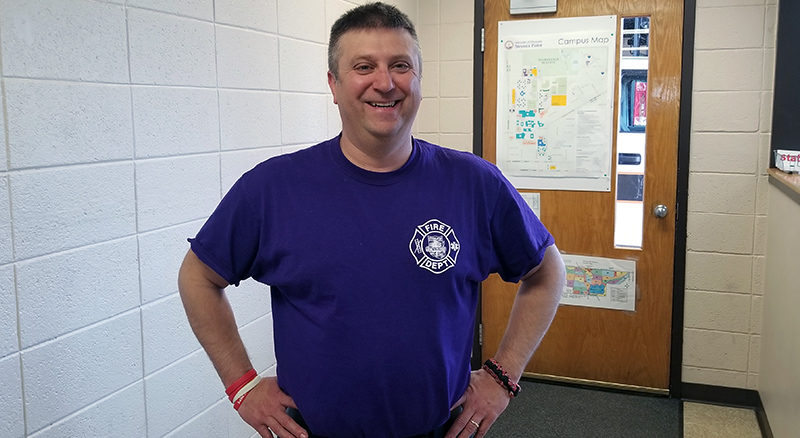County marks Dementia Awareness Week
By Brandi Makuski
Stevens Point paramedics are donning purple this week, part of their efforts to spread dementia awareness across Portage Co.
Dementia Awareness Week runs May 13-17, and the Stevens Point Fire Department is working with the Portage Co. Aging and Disability Resource Center to get the word out: anybody can be inflicted with the terminal brain disease—patients as young as being in their early 20’s have been identified—and patience and understanding are required by those who aren’t.
Carley Prochaska Lee, a dementia care specialist at the ADRC, some a common misconception about dementia is that it’s a mental illness.
“It’s not; it’s an incurable brain disease that will eventually lead to death,” she said.
According to the Alzheimer’s Association, dementia is an overall term that describes a group of symptoms associated with a decline in memory or other thinking skills—severe enough to reduce a person’s ability to perform everyday activities. Alzheimer’s disease accounts for 60 to 80 percent of cases.
Basically, Prochaska Lee said, the disease eats away at brain tissue, shutting down the body’s ability to perform even basic functions like swallowing, walking, or breathing. Some common symptoms, she added, include confusion about one’s surroundings, and visual and auditory hallucinations.
That confusion can lead to fear, Prochaska Lee said, meaning someone afflicted with the disease could panic and become combative, inadvertently hurting themselves or others in the process.
“You just have to defuse the situation; keep people with dementia, or if we suspect dementia, as calm so they can be evaluated and, if necessary, treated,” said Assistant EMS Chief Joe Gemza from the Stevens Point Fire Department.
SPFD is one of several community partners working with the ADRC on the awareness campaign, Gemza said. Their involvement makes sense because the department often responds to area nursing homes and community-based residential facilities to assist patients suffering from the disease.
“We’re seeing an uptick in behavioral health calls to the elderly and people with early onset dementia, both before they are in a nursing home, and even after they are there,” Gemza said. “Society throws out dementia as this giant monster, but it’s really not. Dementia is not a scarlet letter.”
Gemza said vascular dementia, which occurs after a stroke, is statistically one of the most common dementia types, but there are many other conditions that can cause symptoms of dementia.
Some symptoms are reversible, such as thyroid problems and vitamin deficiencies, Prochaska Lee said.
“But at the end of the day, you still have dementia,” she added. “Depending on the type of dementia, they could manifest differently; there are over 120 types of dementia. If you had two people sitting here with dementia, their symptoms could be different.”
Prognoses also vary, Prochaska Lee said. A doctor may tell one patient they’ve got a year left to live, while another patient in similar health could live another 20 years or more.
“It’s different for everyone,” she said. “Some people may be able to have a complete conversation, they tell you they’re fine, then they shut the door and forget their stove is on, and there’s a fire. Not everyone is going to come out and say, ‘By the way, I have a memory impairment; don’t leave me here by myself’, because they may not even know they have a problem.”
Gemza said it’s not uncommon for firefighters/paramedics to respond for a person “isn’t acting like themselves”, but he also noted law enforcement “takes a big brunt” of the anger and panic exhibited by someone with the disease.
“If someone is behaving that way, the initial reaction by people around them is, often, to call the police, because they don’t know they have dementia,” Gemza said.
“They could yell, bite, spit; because that’s their way of communicating to you they’re afraid or confused, or there’s another problem, they may not be able to verbalize it,” Prochaska Lee said. “When you look at someone without dementia—when we have bad days, we get into a bad mood, but we can clearly verbalize what’s going on. Someone with dementia can’t always do that.”
The “uptick” Gemza referenced is known as the “silver tsunami” by Prochaska Lee.
“That Baby Boomer generation is getting older, and people are living a lot longer, and the number one risk factor for dementia is age,” she added. “The longer people live, the greater their chance of getting dementia.”
Prochaska Lee said until recent years, very little education on dementia has been offered to the public or to public service institutions, like local police and fire departments. What was previously characterized as “senility” or “that crazy old person”, she said, is now an organized effort by the ADRC to educate and train as many local residents, businesses, and government agencies as possible to learn the signs of dementia and how to address someone who may have the disease.
The Purple Angel Initiative was kicked off locally three years ago, with purple angel stickers affixed on the front doors and windows of local businesses and other agencies whose staff have completed training offered by the ADRC. In 2016, the county also declared itself “Dementia Friendly” as formal recognition of the ongoing effort.
“There’s a lot of training we’ve done with [Gemza] and his crews, but there is still a lot of education, there are a lot of scenarios we can’t even think of,” Prochaska Lee said. “So it’s an ongoing, kind of never-ending, effort.”
Gemza said the ADRC offers “an unbelievable amount of programs and help” for those afflicted with dementia, and well as family members and other caregivers. Prochaska Lee said the agency offers many programs to help victims and their families navigate the progression of the disease, with resources on placing patients into nursing facilities, social events and memory clinics for those affected, caregiver stress management, financial guidance, and more.
To learn more about dementia training contact the ADRC at (715) 346-1401.

